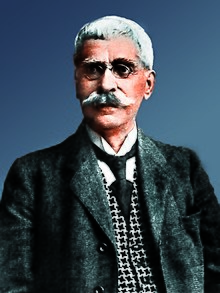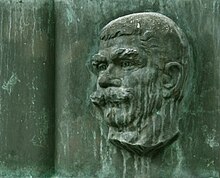Ivan Vazov
You can helpexpand this article with text translated fromthe corresponding articlein Bulgarian.(January 2011)Click [show] for important translation instructions.
|
Ivan Vazov | |
|---|---|
| Иван Минчов Вазов | |
 Contemporary image of writer, Ivan Vazov | |
| Born | 9 July 1850 |
| Died | 22 September 1921(aged 71) |
| Nationality | Bulgarian |
| Occupation(s) | poet, novelist, playwright |
| Known for | Patriarch of Bulgarian literature |
| Partner | Evgenia Mars |
| Parent(s) | Saba and Mincho Vazov |
Ivan Minchov Vazov(Bulgarian:Иван Минчов Вазов;9 July [O.S.27 June] 1850 – 22 September 1921) was aBulgarianpoet,novelist,andplaywright,often referred to as "thePatriarchof Bulgarian literature ".[1][2][3]He was born inSopot,a town in theRose Valleyof Bulgaria (then part of theOttoman Empire). The works of Ivan Vazov reveal two historical epochs - the Bulgarian Renaissance and the Post-Liberation (from Ottoman Empire rule) epoch. Ivan Vazov holds the highest honorary title of the Bulgarian Academy of Sciences - Academician. He acted as Education and People Enlightenment Minister from September 7, 1897, until January 30, 1899, representing the People's Party.
Biography and major works
[edit]The exact date of Vazov's birth is disputed. His parents, Saba and Mincho Vazov, both had a lot of influence on the young poet.
After Ivan finished primary school in Sopot, Mincho sent him toKalofer,appointing him[clarification needed]assistant teacher. Having done his final exams in Kalofer, the young teacher returned to Sopot to help in his father's grocery. The following year his father sent him to Plovdiv toNaiden Gerov's school. There Vazov made his first steps as a poet.
He returned to Sopot only to leave forOltenițainRomania,as his father wanted him to become an apprentice and study trade at his uncle's. Ivan Vazov showed no interest in the trade profession whatsoever. Instead he was immersed in literature. Soon he fled from his uncle's place and went toBrăilawhere he lived with the Bulgarian exiled revolutionaries and metHristo Botev,a Bulgarianrevolutionaryand poet.
In 1874, he joinedthe struggle for his country's independencefrom theOttoman Empire.He returned to Sopot in 1875, where he became a member of the local revolutionary committee. After the failure of theApril Uprisingof 1876, he had to flee the country, going back toGalaţi,where most of the surviving revolutionaries were exiled. There he was appointed a secretary of the committee.
Vazov was probably heavily influenced by Botev, who was the ideological leader of the Bulgarian revolutionary movement. He started writing his famous poems with Botev and some other Bulgarian emigrants in Romania. In 1876 he published his first work,Priaporetz and Gusla,followed by "Bulgaria's Sorrows"in 1877.
Bulgaria regained its independence in 1878 as a result of theRusso-Turkish Warand Vazov wrote the famousEpic of the Forgotten.He became the editor of the political reviewsScienceandDawn.He was, however, forced into exile once again, this time toOdesa,because of the persecution of the russophile political faction. Returning to Bulgaria with the help of his mother Saba Vazova, he started teaching. Vazov's next stay was inSvishtov,where he became acivil servant.

He moved toSofiain 1889 where he started publishing the reviewDennitsa.
Vazov's 1888 novelUnder the Yoke,which depicts the Ottoman oppression of Bulgaria, is the most famous piece of classic Bulgarian literature and has been translated into over 30 languages.[4]
Later in his life Vazov was a prominent and widely respected figure in the social and cultural life of newly independent Bulgaria. He died on September 22, 1921.
Other famous works
[edit]Some of the other famous works by Vazov include the novelsNew Country(1894),Under Our Heaven(1900),The Empress of Kazalar(1902),Songs of Macedonia(1914),It Will Not Perish(1920) and the playsVagabonds(1894),A Newspaperman?(1900),Borislav(1909) andIvaylo(1911).
Vazov also wrote the first Bulgarianscience fictionstoryThe Last Day of XX Century(1899), the first BulgarianfantasypoemIn the Kingdom of the Fairies(1884) and some other fantasy poetry.[5]

Historical site
[edit]
Vazov's home in Sofia has been turned into a museum, containing a restoration of his residence with period furnishings, as well as Vazov's taxidermically preserved dog. Although the museum is ostensibly open Tuesday through Saturday, it is in practice not always staffed, so visitors are advised to call in advance. The museum is located at the corner of Ivan Vazov Street andGeorgi S. RakovskiStreet in Sofia. Another gem of a museum is his large home in Berkovista. It is filled with poetry combined with old photographs of the area and the revolution, blown up to poster size. The second floor has two large meeting rooms, one for men, the other for women. Platform couches doubled as beds.
Honours
[edit]The BulgarianIvan Vazov National Theatrein Sofia is named after him, the "Ivan Vazov" neighborhood inSofia,as is theIvan Vazov National Library(Bulgarian:Народна библиотека "Иван Вазов") in Plovdiv. A park nearSt. Sofia Churchin Sofia features the city's best-known monument to Vazov.
Vazovova Street inBratislava,Slovakia,andVazov PointandVazov RockonLivingston Islandin theSouth Shetland Islands,Antarcticaare also named after him.[6]
In 1917, he was nominated for theNobel Prizein literature.[7]
See also
[edit]Notes
[edit]- ^Bourchier, James David(1911)..InChisholm, Hugh(ed.).Encyclopædia Britannica.Vol. 04 (11th ed.). Cambridge University Press. pp. 784–786, see page 786, around line 20.
The most distinguished Bulgarian man of letters is Ivan Vazoff (b. 1850), whose epic and lyric poems and prose works form the best specimens of the modern literary language. His novel Pod Igoto....
- ^Grogan, Ellinor (June 1922). "Ivan Vazov".The Slavonic Review.1(1): 225–227.JSTOR4201601.
- ^Robinson, Lucy Catlin Bull (1917). "Ivan Vazov, Critical and Biographical Introduction". InWarner, C.D.;et al. (eds.).The Library of the World's Best Literature. An Anthology in Thirty Volumes.Vol. 26.Retrieved18 June2018– via Bartleby (Great Books Online).
- ^SeeVazoff, Ivan (1912).Under the Yoke: A Romance of Bulgarian Liberty with An Introduction by Edmund Gosse.London: William Heinemann.Retrieved17 June2018– via Internet Archive.
- ^"Форум Иван Ефремов • Виж темата - Фантастична поезия (2)".sf-sofia.Retrieved2024-01-09.
- ^Vazov PointSCAR Composite Gazetteer of Antarctica
- ^"Nomination Database".RetrievedMay 27,2016– via Nobelprize.org.
References
[edit]- Bull, Lucy Catlin (1897)."Ivan Vazoff (1850 -)".InWarner, Charles Dudley(ed.).Library of the World's Best Literature. Ancient and Modern.Vol. 26. New York: R.S.Peale and J.A. Hill. pp. 15263–15286.RetrievedJune 18,2018– via Internet Archive.
- Tsanoff, Radoslav Andrea (1908)."Ivan Vazoff: Balkan Poet and Novelist".Poet Lore, A Magazine of Letters.19.New York: AMS Reprint Company: 98–110.RetrievedJune 18,2018– via HathiTrust Digital Library.
- Gosse, Edmund(1912). "Introduction".Under the Yoke: A Romance of Bulgarian Liberty by Ivan Vazoff.London: William Heinemann. pp. i–ix.Retrieved18 June2018– via Internet Archive.
- Keller, Helen Rex (1923). "Under the Yoke (" Pod Igoto) ".The Reader's Digest of Books.New York: The Macmillan Company. pp. 868–869.RetrievedJune 18,2018– via HathiTrust Digital Collection.
- Ташев, Ташо. Министрите на България 1879–1999. София, АИ „Проф. Марин Дринов “/ Изд. на МО, 1999.ISBN978-954-430-603-8/ ISBN 978-954-509-191- 9. с. 74–75.
- Карчев, Петър. През прозореца на едно полустолетие (1900-1950), София, 2004, стр. 274.
- Михаил Арнаудов. „Македония като българска земя “. (беседа, държана в Битоля на 4 юли 1941 г.)
- Бачева, Ирина и др. Кратък летопис. // vazovmuseum. Къща музей "Иван Вазов" - Сопот, 2013. Посетен на 2013-03-18.
- Аврамов, Румен. Комуналният капитализъм: Т.II. София, Фондация Българска наука и култура / Център за либерални стратегии, 2007.ISBN978-954-90758-8-5.с. 22.
- The Nomination Database for the Nobel Prize in Literature, 1901–1950. // Nobelprize.org.
- SCAR Composite Gazetteer of Antarctica: Vazov Point.
- Нацева, Розалина, Любен Иванов, Инес Лазарова, Петя Кръстева. Каталог на българските банкноти. Българска народна банка. С., 2004.ISBN954-9791-74-2,с. 107
External links
[edit]- Works by Ivan VazovatProject Gutenberg
- Works by or about Ivan Vazovat theInternet Archive
- Works by Ivan VazovatLibriVox(public domain audiobooks)

- Vazov, I. Under the Yoke. A Romance of Bulgarian Liberty. With an Introduction by E. Gosse. A New and Revised Edition. London, 1912
- Ivan Vazov’s place in Bulgaria’s heritage
- Ivan Vazov – The revolutionary poet
- Chisholm, Hugh,ed. (1911)..Encyclopædia Britannica(11th ed.). Cambridge University Press.
- 1850 births
- 1921 deaths
- People from Sopot, Plovdiv Province
- People's Party (Bulgaria) politicians
- 19th-century Bulgarian poets
- Bulgarian male poets
- Bulgarian novelists
- Bulgarian male novelists
- Bulgarian dramatists and playwrights
- Male dramatists and playwrights
- Bulgarian people of the Russo-Turkish War (1877–1878)
- 19th-century Bulgarian people
- Members of the National Assembly (Bulgaria)
- Members of the Bulgarian Academy of Sciences
- 19th-century Bulgarian novelists
- 20th-century Bulgarian novelists
